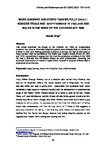More Ignorant and Stupid than Wilfully Cruel’: Homicide Trials and ‘Baby-Farming’ in England and Wales in the Wake of the Children Act 1908
| dc.contributor.author | Grey, Daniel | |
| dc.date.accessioned | 2017-03-14T16:14:23Z | |
| dc.date.accessioned | 2017-04-10T15:55:11Z | |
| dc.date.available | 2017-03-14T16:14:23Z | |
| dc.date.available | 2017-04-10T15:55:11Z | |
| dc.date.issued | 2009-11 | |
| dc.identifier.citation |
Grey, D. (2009) 'More Ignorant and Stupid than Wilfully Cruel’: Homicide Trials and ‘Baby-Farming’ in England and Wales in the Wake of the Children Act 1908', Crimes and Misdemeanours: Deviance and the Law in Historical Perspective, 3(2), pp.60-77. Available at: https://pearl.plymouth.ac.uk/handle/10026.1/8844 | en_US |
| dc.identifier.issn | 1754-0445 | |
| dc.identifier.uri | http://hdl.handle.net/10026.1/8844 | |
| dc.description.abstract |
This article examines the impact of the Children Act 1908 on longstanding concerns that foster or informally 'adoptive' parents were uniquely likely to murder the children in their care. Making particular reference to the last two high-profile cases of 'baby-farmers' tried for homicide on the Welsh and English Assize circuits (in 1907 and 1919, respectively) it argues that the infant life protection provisions in the 1908 Act had a dramatic and immediate impact on such prosecutions, removing the automatic presumption of malice in cases where fostered or adopted children died in suspicious circumstances. | en_US |
| dc.language.iso | en | en_US |
| dc.publisher | University of Plymouth | |
| dc.rights | Attribution 4.0 International (CC BY 4.0) | * |
| dc.rights.uri | https://creativecommons.org/licenses/by/4.0/ | * |
| dc.subject | baby-farming | en_US |
| dc.subject | Infant Life Protection Acts | en_US |
| dc.subject | child homicide | en_US |
| dc.title | More Ignorant and Stupid than Wilfully Cruel’: Homicide Trials and ‘Baby-Farming’ in England and Wales in the Wake of the Children Act 1908 | en_US |
| dc.type | Article | en_US |
| dc.type | Article | |
| plymouth.issue | 2 | |
| plymouth.volume | 3 | |
| plymouth.journal | SOLON Crimes and Misdemeanours |



